2023年中考英语复习 专题二 冠词课件(38张PPT)
文档属性
| 名称 | 2023年中考英语复习 专题二 冠词课件(38张PPT) |  | |
| 格式 | ppt | ||
| 文件大小 | 2.4MB | ||
| 资源类型 | 教案 | ||
| 版本资源 | 人教新目标(Go for it)版 | ||
| 科目 | 英语 | ||
| 更新时间 | 2023-06-11 15:33:28 | ||
图片预览

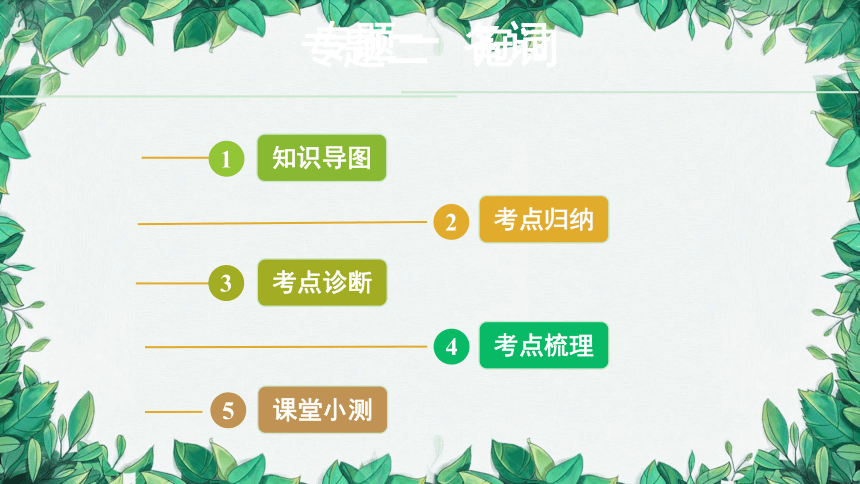
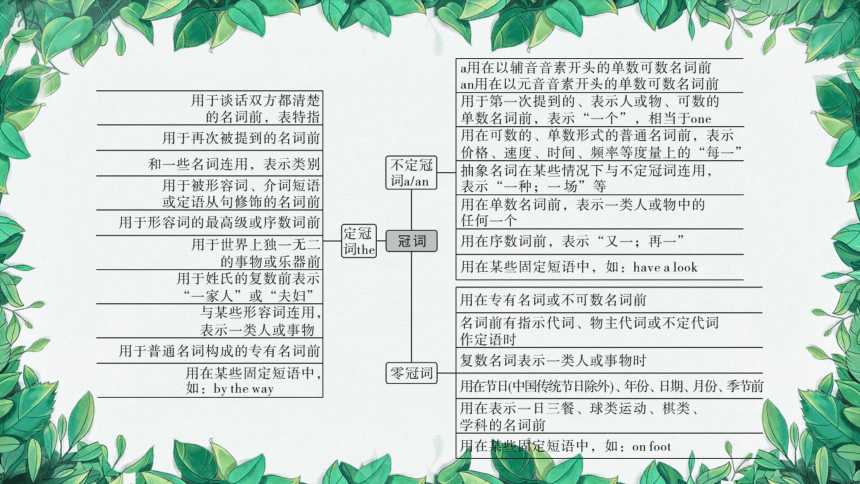
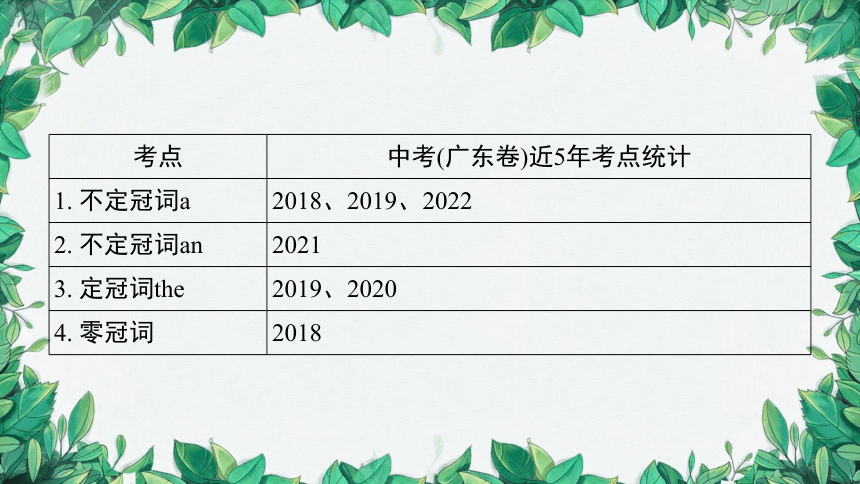
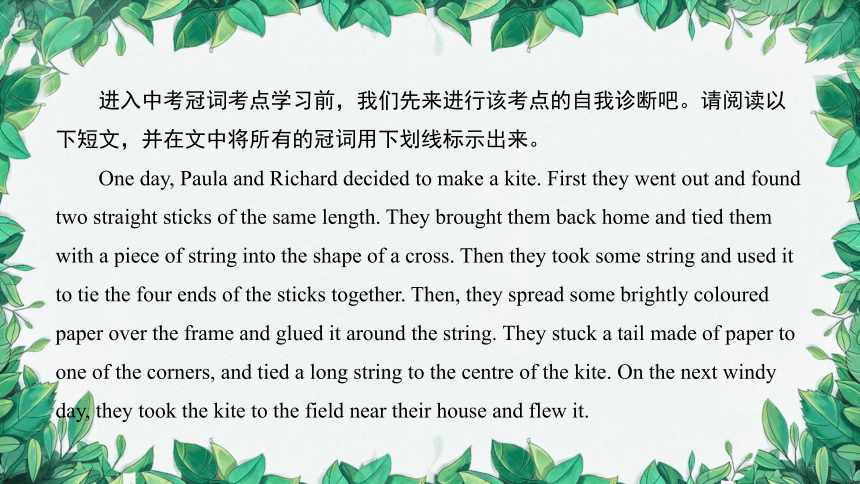
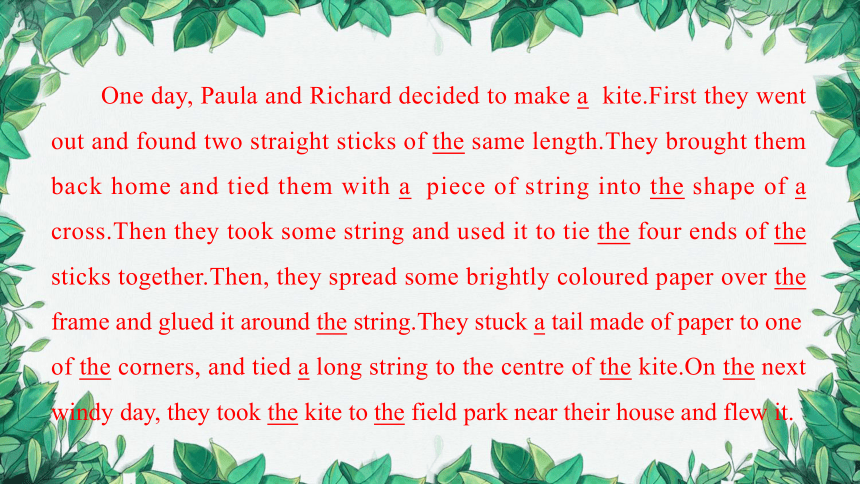
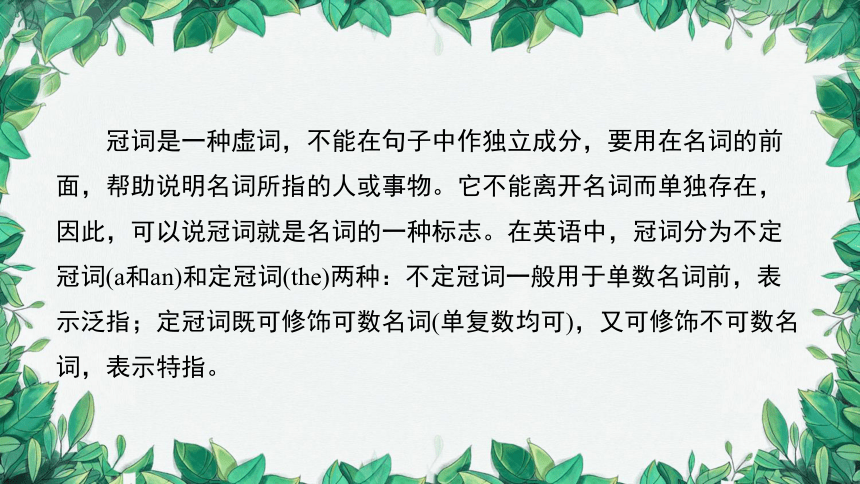

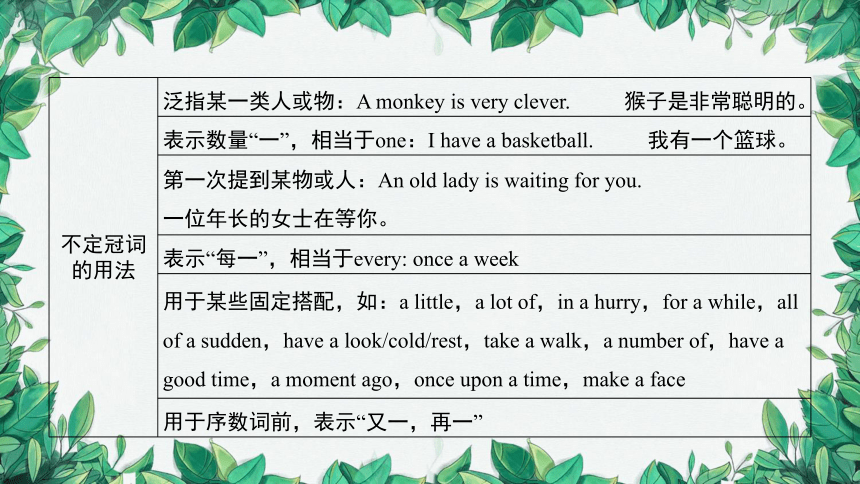
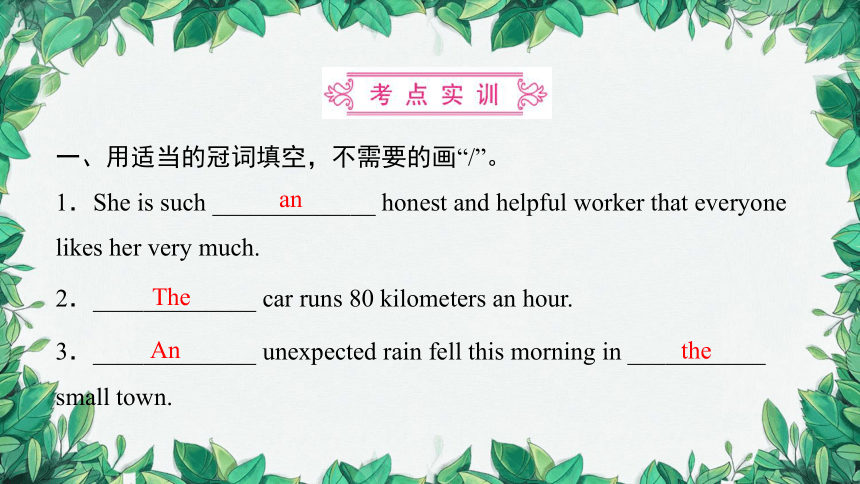
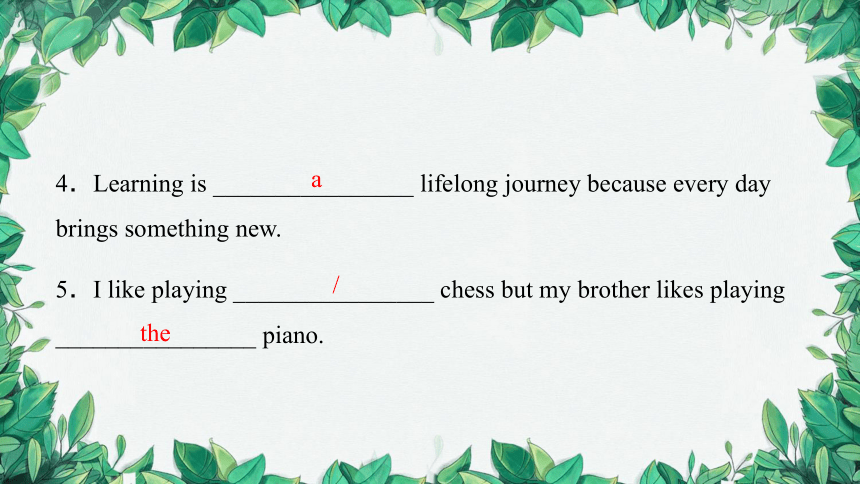
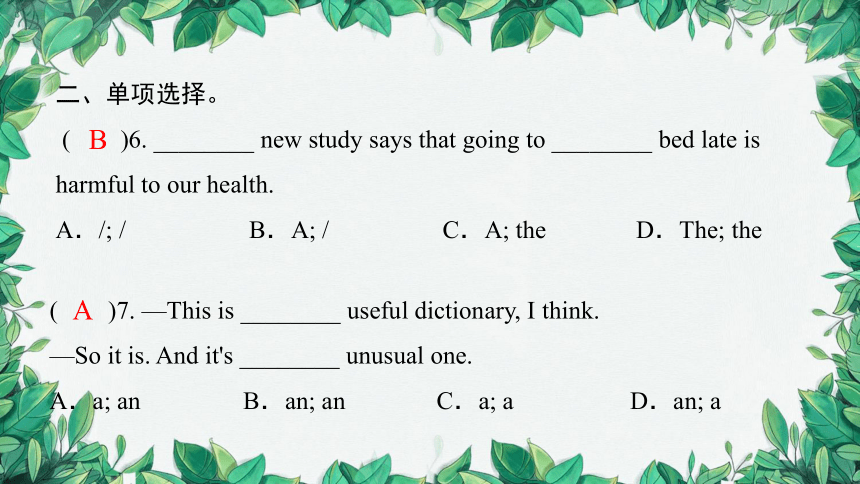
文档简介
(共38张PPT)
第一部分
语法专题训练
专题一 名词
1
知识导图
2
考点归纳
3
考点诊断
4
考点梳理
5
专题二 冠词
课堂小测
考点 中考(广东卷)近5年考点统计
1. 不定冠词a 2018、2019、2022
2. 不定冠词an 2021
3. 定冠词the 2019、2020
4. 零冠词 2018
进入中考冠词考点学习前,我们先来进行该考点的自我诊断吧。请阅读以下短文,并在文中将所有的冠词用下划线标示出来。
One day, Paula and Richard decided to make a kite. First they went out and found two straight sticks of the same length. They brought them back home and tied them with a piece of string into the shape of a cross. Then they took some string and used it to tie the four ends of the sticks together. Then, they spread some brightly coloured paper over the frame and glued it around the string. They stuck a tail made of paper to one of the corners, and tied a long string to the centre of the kite. On the next windy day, they took the kite to the field near their house and flew it.
One day, Paula and Richard decided to make a kite.First they went out and found two straight sticks of the same length.They brought them back home and tied them with a piece of string into the shape of a cross.Then they took some string and used it to tie the four ends of the sticks together.Then, they spread some brightly coloured paper over the frame and glued it around the string.They stuck a tail made of paper to one of the corners, and tied a long string to the centre of the kite.On the next windy day, they took the kite to the field park near their house and flew it.
冠词是一种虚词,不能在句子中作独立成分,要用在名词的前面,帮助说明名词所指的人或事物。它不能离开名词而单独存在,因此,可以说冠词就是名词的一种标志。在英语中,冠词分为不定冠词(a和an)和定冠词(the)两种:不定冠词一般用于单数名词前,表示泛指;定冠词既可修饰可数名词(单复数均可),又可修饰不可数名词,表示特指。
考点一:
不定冠词
不定冠词a
和an的区别 a修饰辅音音素开头的可数名词,而an修饰元音音素开头的可数名词:a boy,a book,an orange,an apple,an eraser,an island,an “F”/“M”/“X”
◆单独字母前的a 和an的选用请记住一句话:Mr. Li has one fox. 字母在这句话里面的用an,不在的用a
不发音的h:an hour,an honest boy
u字母开头的单词:a university,a uniform,a useful book,a UFO,a union(u发[ju:],辅音音素开头),an umbrella,an unusual story(u发[ ],元音音素开头)
不定冠词的用法 泛指某一类人或物:A monkey is very clever. 猴子是非常聪明的。
表示数量“一”,相当于one:I have a basketball. 我有一个篮球。
第一次提到某物或人:An old lady is waiting for you.
一位年长的女士在等你。
表示“每一”,相当于every: once a week
用于某些固定搭配,如:a little,a lot of,in a hurry,for a while,all of a sudden,have a look/cold/rest,take a walk,a number of,have a good time,a moment ago,once upon a time,make a face
用于序数词前,表示“又一,再一”
一、用适当的冠词填空,不需要的画“/”。
1.She is such _____________ honest and helpful worker that everyone likes her very much.
2._____________ car runs 80 kilometers an hour.
3._____________ unexpected rain fell this morning in ___________ small town.
an
The
An
the
4.Learning is ________________ lifelong journey because every day brings something new.
5.I like playing ________________ chess but my brother likes playing ________________ piano.
a
/
the
二、单项选择。
( )6. ________ new study says that going to ________ bed late is harmful to our health.
A./; / B.A; / C.A; the D.The; the
( )7. —This is ________ useful dictionary, I think.
—So it is. And it's ________ unusual one.
A.a; an B.an; an C.a; a D.an; a
B
A
( )8. ________ China is ________ old country with ________ long history.
A.The; an; a B.不填; an; the C.The; a; a D.不填; an; a
( )9. David is such ________ wonderful teacher that I have ________ great fun in his class!
A.a; the B.a; / C.a; a D.the; /
D
B
( )10. If you want to take ________ short ride in the city, choose ________ shared bike.
A.a; / B.the; the
C.a; a D./; a
C
考点二:
定冠词
用法 例子
1. 特指某些人或某些物或上文已经提到过的人或物 The girl under the tree is my sister.
树下的女孩是我的姐姐。
2. 指谈话双方都知道的人或物 Where's the police station 警察局在哪里?
3. 世界上独一无二的事物 The sun rises in the east. 太阳从东方升起。
4. 用在乐器前 Can you play the piano 你会弹钢琴吗?
5. 用在序数词和形容词最高级前 He is always the first to school,so he is one of the most hard working students in his class.
他总是第一个到学校,所以他是班里最勤奋的学生之一。
用法 例子
6. 用在方位词前 Shanghai is in the east of China.
上海位于中国的东部。
7. 用在姓氏的复数前,表示
“一家人”或“夫妇”两人 The Greens are on vacation in Beijing.
格林一家在北京度假。
8. 用在某些形容词前,表示
“某一类人” The young should take care of the old.
年轻人应该照顾老人。
9. 江河湖海及山脉前 The Yellow River is the second longest river in China.
黄河是中国的第二长河。
10. 名词后有后置定语(定语从句,介词短语等) The book I bought yesterday was lost this morning.
我昨天买的那本书在今天早上丢了。
11. 用在普通名词构成的专有名词前 The Great Wall is a good place to go sightseeing.
长城是观光的好地方。
用法 例子
12. 用在某些固定词组中:
all the time(一直) at the same time(同时) at the moment(此时)
at the end of(在……的尽头) at the age of(在……岁时) by the way(顺便一提)
in the end(最后) in the morning(在早上) in the future(在未来)
in the middle of(在……中间) in the front of(在……的前面)
look the same(看上去一样) on the way(to) (在……的路上)
the day after tomorrow(后天) the number of(……的数量)
一、单项选择。
( )11. Look, there is ________ “u” and ________ “s” in the word university.
A.a; a B.a; an C.an;an D.an; a
( )12. —Look at ________ boy over there. He looks excited.
—Yeah,he has won ________ first prize in the school English Reading & Writing Competition.
A.a; the B.the; a C.the; the D.a; a
B
C
( )13. To save time, many students have ________ lunch at school every day.
A.a B.an C./ D.the
( )14. Berlin is ________ capital of Germany.
A./ B.a C.the D.an
( )15. Qingdao is a beautiful city that lies in ________ east of China.
A.an B./ C.the D.a
C
C
C
二、用适当的冠词填空。
The graduation ceremony is over. We will leave school soon. I feel very excited because I am one of 16. _______________ best graduates. At 17. _______________ same time, I am a little sad because I have to say goodbye to my classmates and teachers. I want to take some photos with them and I will give some gifts to my teachers as well. In 18. ______________ past three years, I had 19. _______________ good time in Beijing International School. I have learnt not only how to study, but also how to be a man. In 20. ________________ future, I will work much harder. I hope I can be 21. ________________ astronaut when I grow up.
the
the
the
a
the
an
考点三:
无冠词的情况
用法 例子
1. 泛指一类人或物 Money is not everything. (不可数名词) 钱不是万能的。
Monkeys are clever. (复数名词) 猴子很聪明的。
2. 名词前有限定词时,无需再用冠词。常用限定词包括:指示代词(this,that,these,those);形容词性物主代词(my,your,his,her,their,our);其他词(some,any,no,every…) This is my room.
这是我的房间。
Tony is my best friend.
托尼是我最好的朋友。
3. 在年,星期、月份、季节、节日前 in 2022, in January, in summer, on Sunday, on Children's Day
用法 例子
4. 在语言、学科、三餐、球类运动、棋类运动前(三餐前有形容词修饰时,用不定冠词) They have breakfast at home every day.
他们每天在家吃早餐。
We always have a big dinner at the Spring Festival.
春节我们通常吃丰盛的晚餐。
Simon likes playing chess. 西蒙喜欢下棋。
5. 与by连用的交通工具名称前 Most students in the city go to school by bus. = Most students in the city go to school on the bus.
城里大部分学生乘公共汽车上学。
6. 专有名词(人名、地名等)前 Peking University, Guangdong, Mary
用法 例子
7. 在固定短语中:
at first(最初) at work(上班)
at night(在晚上) at home(在家)
at once(马上) day and night(整日整夜)
on foot(步行) go to school(去上学)
go to bed(去睡觉) in time(及时)
in sight(看见) on time(按时)
watch TV(看电视) learn by heart(用心学)
by mistake(错误地) year after year(一年又一年)
语法选择。
Yoro Touray was the son of a couple from Gambia(冈比亚). It's __22__ small country in West Africa. Yoro was born and raised in __23__ United States. He seldom did exercise, such as playing __24__ basketball.
( )22. A. a B.an C.the
( )23. A. a B.an C.the
( )24. A. a B.the C./
A
C
C
But he developed __25__ interest in the Gambian music.
One day Yoro searched for some information about Gambian music. But he found __26__ information was out of date. Thinking about doing something to improve the situation, he decided to do __27__ real life record.
( )25. A. a B.an C.the
( )26. A. a B.an C.the
( )27. A. a B.an C.the
B
C
A
Yoro flew to Gambia in his spare time. Because most of __28__ people there spoke the local language, Yoro had difficulty communicating with them. Yoro asked his parents' friends in Serekunda(萨拉昆达) for help. It's __29__ exciting visit. They helped Yoro communicate with local people, interview the Gambian music singers and record the Gambian music songs.
( )28. A. a B.an C.the
( )29. A. a B.an C.the
C
B
After returning home, it took him __30__ long time to reorganize his record. He also wrote some comments(评论) about life and culture in Gambia. He sent them online, which made __31__ whole world pay attention to the Gambian culture. Encouraged by the wide influence of his works, Yoro chose to learn journalism(新闻学) in the university. Because of his hard work, he was given a title of “Young Journalist of the Year”.
( )30. A. a B.an C.the
( )31. A. a B.an C.the
A
C
1.有无定冠词的区别
at table 吃饭 at the table 在桌子旁
in hospital 因病住院 in the hospital 在医院里(不一定是病人)
in front of 在前方(在指定范围之外) in the front of 在……前方(在指定范围之内)
in class 在课堂上 in the class 在班上
on earth 究竟 on the earth 在地球上
2. a number of和the number of
a number of 意为“许多,大量的”,后跟可数名词复数形式,作主语时,谓语动词用复数形式。
the number of 意为“……的数量”,后跟可数名词复数形式,但作主语时,谓语动词用单数形式。
eg. A number of books are on sale in the store.
书店里很多的书都是大减价。
The number of the books is 2,000. 书的数量是两千本。
用适当的冠词填空,不需要的画“/”。
32.What________________ good weather it is today!
33. ________________ woman in red is my aunt. She is a teacher.
34.I would like to take ________________ walk with my family after dinner.
/
The
a
35.The most important tradition in Chinese family is to respect ________________ old and love ________________ young.
36.—Have you seen ________________ TV program I volunteer
—Yes, I have never seen such ________________ educational program.
the
the
the
an
(满分:25分) 你的得分:__________
一、语法选择。(共10小题,每小题1分,共10分)
Jack was a rich young man. One day, he was driving his shining new BMW car very happily down a street. Suddenly from his car came __1__ terrible sound. He felt surprised, so he stopped his car and looked around. He saw a child standing nearby with __2__ small stones in his hand.
( )1. A. / B.a C.an
( )2. A. few B.a few C.little
B
B
He jumped __3__ the car and found a dent(凹痕) in the door. He was so angry that he caught the boy and shouted at him, “Who are you Why did you throw a stone at my new car?”
“Please, sir, please…I am sorry! But I didn't know __4__ else to do,”said the child. “I threw the stone because I wanted you __5__ me.
( )3. A. on B.down C.out of
( )4. A. which B.how C.what
( )5. A. noticing B.to notice C.notice
C
C
B
I need your help!” Tears were running on the __6__ face. He said, “My brother fell out of his wheelchair and was almost under it. He was hurt but I can do nothing __7__ he is too heavy for me. Could you give me a hand to get him back into his wheelchair?”
( )6. A. child's B.childs' C.child'
( )7. A. though B.when C.because
A
C
After hearing this, Jack __8__ and hurried to help him. He lifted the child's brother gently back into his wheelchair. He looked over the boy __9__ to make sure that he was OK. Then he watched the child push his brother towards __10__ home. Suddenly the child turned around and bowed(鞠躬)
to him. Jack felt pleased. He looked at the dent in his car and smiled.
( )8. A. was moved B.moved C.is moved
( )9. A. care B.careful C.carefully
( )10. A. their B.theirs C.they
A
C
A
二、短文填空。(共10小题,每小题1. 5分,共15分)
There were two fishermen who were good at fishing. One day they went to __11__ beautiful lake to fish. One of __12__ enjoyed fishing alone. And the other was an outgoing person who loved to __13__ friends with different people.
11. 12. 13. .
a
them
make
__14__ the outgoing fisherman found that some tourists at the lake couldn't catch any fish, “I will teach you how to do that,” he said to them. “If you catch 10 fish, give me one. If you don't get 10, you needn't give me anything. ”
They felt like old friends at first sight. They agreed __15__ each other immediately. After he finished teaching a group, he went to teach another group. He was very __16__ teaching others. And the tourists __17__ him one for every 10 fish that they caught.
14. . 15. . 16. 17. ..
When/After
with
busy
gave
At the end of the day, the fisherman __18__ kindly helped others received a full basket of fish, and also got to know a large group of new friends. At the same __19__, he was respected as a teacher.
__20__,the other fisherman didn't have much fun. Even he became much lonelier. After fishing for a whole day alone, he looked into the fish basket, and found he had few fish. He was very sad.
So if we help others succeed, we can get both success and friends.
18. 19. 20. .
who/that
time
However
第一部分
语法专题训练
专题一 名词
1
知识导图
2
考点归纳
3
考点诊断
4
考点梳理
5
专题二 冠词
课堂小测
考点 中考(广东卷)近5年考点统计
1. 不定冠词a 2018、2019、2022
2. 不定冠词an 2021
3. 定冠词the 2019、2020
4. 零冠词 2018
进入中考冠词考点学习前,我们先来进行该考点的自我诊断吧。请阅读以下短文,并在文中将所有的冠词用下划线标示出来。
One day, Paula and Richard decided to make a kite. First they went out and found two straight sticks of the same length. They brought them back home and tied them with a piece of string into the shape of a cross. Then they took some string and used it to tie the four ends of the sticks together. Then, they spread some brightly coloured paper over the frame and glued it around the string. They stuck a tail made of paper to one of the corners, and tied a long string to the centre of the kite. On the next windy day, they took the kite to the field near their house and flew it.
One day, Paula and Richard decided to make a kite.First they went out and found two straight sticks of the same length.They brought them back home and tied them with a piece of string into the shape of a cross.Then they took some string and used it to tie the four ends of the sticks together.Then, they spread some brightly coloured paper over the frame and glued it around the string.They stuck a tail made of paper to one of the corners, and tied a long string to the centre of the kite.On the next windy day, they took the kite to the field park near their house and flew it.
冠词是一种虚词,不能在句子中作独立成分,要用在名词的前面,帮助说明名词所指的人或事物。它不能离开名词而单独存在,因此,可以说冠词就是名词的一种标志。在英语中,冠词分为不定冠词(a和an)和定冠词(the)两种:不定冠词一般用于单数名词前,表示泛指;定冠词既可修饰可数名词(单复数均可),又可修饰不可数名词,表示特指。
考点一:
不定冠词
不定冠词a
和an的区别 a修饰辅音音素开头的可数名词,而an修饰元音音素开头的可数名词:a boy,a book,an orange,an apple,an eraser,an island,an “F”/“M”/“X”
◆单独字母前的a 和an的选用请记住一句话:Mr. Li has one fox. 字母在这句话里面的用an,不在的用a
不发音的h:an hour,an honest boy
u字母开头的单词:a university,a uniform,a useful book,a UFO,a union(u发[ju:],辅音音素开头),an umbrella,an unusual story(u发[ ],元音音素开头)
不定冠词的用法 泛指某一类人或物:A monkey is very clever. 猴子是非常聪明的。
表示数量“一”,相当于one:I have a basketball. 我有一个篮球。
第一次提到某物或人:An old lady is waiting for you.
一位年长的女士在等你。
表示“每一”,相当于every: once a week
用于某些固定搭配,如:a little,a lot of,in a hurry,for a while,all of a sudden,have a look/cold/rest,take a walk,a number of,have a good time,a moment ago,once upon a time,make a face
用于序数词前,表示“又一,再一”
一、用适当的冠词填空,不需要的画“/”。
1.She is such _____________ honest and helpful worker that everyone likes her very much.
2._____________ car runs 80 kilometers an hour.
3._____________ unexpected rain fell this morning in ___________ small town.
an
The
An
the
4.Learning is ________________ lifelong journey because every day brings something new.
5.I like playing ________________ chess but my brother likes playing ________________ piano.
a
/
the
二、单项选择。
( )6. ________ new study says that going to ________ bed late is harmful to our health.
A./; / B.A; / C.A; the D.The; the
( )7. —This is ________ useful dictionary, I think.
—So it is. And it's ________ unusual one.
A.a; an B.an; an C.a; a D.an; a
B
A
( )8. ________ China is ________ old country with ________ long history.
A.The; an; a B.不填; an; the C.The; a; a D.不填; an; a
( )9. David is such ________ wonderful teacher that I have ________ great fun in his class!
A.a; the B.a; / C.a; a D.the; /
D
B
( )10. If you want to take ________ short ride in the city, choose ________ shared bike.
A.a; / B.the; the
C.a; a D./; a
C
考点二:
定冠词
用法 例子
1. 特指某些人或某些物或上文已经提到过的人或物 The girl under the tree is my sister.
树下的女孩是我的姐姐。
2. 指谈话双方都知道的人或物 Where's the police station 警察局在哪里?
3. 世界上独一无二的事物 The sun rises in the east. 太阳从东方升起。
4. 用在乐器前 Can you play the piano 你会弹钢琴吗?
5. 用在序数词和形容词最高级前 He is always the first to school,so he is one of the most hard working students in his class.
他总是第一个到学校,所以他是班里最勤奋的学生之一。
用法 例子
6. 用在方位词前 Shanghai is in the east of China.
上海位于中国的东部。
7. 用在姓氏的复数前,表示
“一家人”或“夫妇”两人 The Greens are on vacation in Beijing.
格林一家在北京度假。
8. 用在某些形容词前,表示
“某一类人” The young should take care of the old.
年轻人应该照顾老人。
9. 江河湖海及山脉前 The Yellow River is the second longest river in China.
黄河是中国的第二长河。
10. 名词后有后置定语(定语从句,介词短语等) The book I bought yesterday was lost this morning.
我昨天买的那本书在今天早上丢了。
11. 用在普通名词构成的专有名词前 The Great Wall is a good place to go sightseeing.
长城是观光的好地方。
用法 例子
12. 用在某些固定词组中:
all the time(一直) at the same time(同时) at the moment(此时)
at the end of(在……的尽头) at the age of(在……岁时) by the way(顺便一提)
in the end(最后) in the morning(在早上) in the future(在未来)
in the middle of(在……中间) in the front of(在……的前面)
look the same(看上去一样) on the way(to) (在……的路上)
the day after tomorrow(后天) the number of(……的数量)
一、单项选择。
( )11. Look, there is ________ “u” and ________ “s” in the word university.
A.a; a B.a; an C.an;an D.an; a
( )12. —Look at ________ boy over there. He looks excited.
—Yeah,he has won ________ first prize in the school English Reading & Writing Competition.
A.a; the B.the; a C.the; the D.a; a
B
C
( )13. To save time, many students have ________ lunch at school every day.
A.a B.an C./ D.the
( )14. Berlin is ________ capital of Germany.
A./ B.a C.the D.an
( )15. Qingdao is a beautiful city that lies in ________ east of China.
A.an B./ C.the D.a
C
C
C
二、用适当的冠词填空。
The graduation ceremony is over. We will leave school soon. I feel very excited because I am one of 16. _______________ best graduates. At 17. _______________ same time, I am a little sad because I have to say goodbye to my classmates and teachers. I want to take some photos with them and I will give some gifts to my teachers as well. In 18. ______________ past three years, I had 19. _______________ good time in Beijing International School. I have learnt not only how to study, but also how to be a man. In 20. ________________ future, I will work much harder. I hope I can be 21. ________________ astronaut when I grow up.
the
the
the
a
the
an
考点三:
无冠词的情况
用法 例子
1. 泛指一类人或物 Money is not everything. (不可数名词) 钱不是万能的。
Monkeys are clever. (复数名词) 猴子很聪明的。
2. 名词前有限定词时,无需再用冠词。常用限定词包括:指示代词(this,that,these,those);形容词性物主代词(my,your,his,her,their,our);其他词(some,any,no,every…) This is my room.
这是我的房间。
Tony is my best friend.
托尼是我最好的朋友。
3. 在年,星期、月份、季节、节日前 in 2022, in January, in summer, on Sunday, on Children's Day
用法 例子
4. 在语言、学科、三餐、球类运动、棋类运动前(三餐前有形容词修饰时,用不定冠词) They have breakfast at home every day.
他们每天在家吃早餐。
We always have a big dinner at the Spring Festival.
春节我们通常吃丰盛的晚餐。
Simon likes playing chess. 西蒙喜欢下棋。
5. 与by连用的交通工具名称前 Most students in the city go to school by bus. = Most students in the city go to school on the bus.
城里大部分学生乘公共汽车上学。
6. 专有名词(人名、地名等)前 Peking University, Guangdong, Mary
用法 例子
7. 在固定短语中:
at first(最初) at work(上班)
at night(在晚上) at home(在家)
at once(马上) day and night(整日整夜)
on foot(步行) go to school(去上学)
go to bed(去睡觉) in time(及时)
in sight(看见) on time(按时)
watch TV(看电视) learn by heart(用心学)
by mistake(错误地) year after year(一年又一年)
语法选择。
Yoro Touray was the son of a couple from Gambia(冈比亚). It's __22__ small country in West Africa. Yoro was born and raised in __23__ United States. He seldom did exercise, such as playing __24__ basketball.
( )22. A. a B.an C.the
( )23. A. a B.an C.the
( )24. A. a B.the C./
A
C
C
But he developed __25__ interest in the Gambian music.
One day Yoro searched for some information about Gambian music. But he found __26__ information was out of date. Thinking about doing something to improve the situation, he decided to do __27__ real life record.
( )25. A. a B.an C.the
( )26. A. a B.an C.the
( )27. A. a B.an C.the
B
C
A
Yoro flew to Gambia in his spare time. Because most of __28__ people there spoke the local language, Yoro had difficulty communicating with them. Yoro asked his parents' friends in Serekunda(萨拉昆达) for help. It's __29__ exciting visit. They helped Yoro communicate with local people, interview the Gambian music singers and record the Gambian music songs.
( )28. A. a B.an C.the
( )29. A. a B.an C.the
C
B
After returning home, it took him __30__ long time to reorganize his record. He also wrote some comments(评论) about life and culture in Gambia. He sent them online, which made __31__ whole world pay attention to the Gambian culture. Encouraged by the wide influence of his works, Yoro chose to learn journalism(新闻学) in the university. Because of his hard work, he was given a title of “Young Journalist of the Year”.
( )30. A. a B.an C.the
( )31. A. a B.an C.the
A
C
1.有无定冠词的区别
at table 吃饭 at the table 在桌子旁
in hospital 因病住院 in the hospital 在医院里(不一定是病人)
in front of 在前方(在指定范围之外) in the front of 在……前方(在指定范围之内)
in class 在课堂上 in the class 在班上
on earth 究竟 on the earth 在地球上
2. a number of和the number of
a number of 意为“许多,大量的”,后跟可数名词复数形式,作主语时,谓语动词用复数形式。
the number of 意为“……的数量”,后跟可数名词复数形式,但作主语时,谓语动词用单数形式。
eg. A number of books are on sale in the store.
书店里很多的书都是大减价。
The number of the books is 2,000. 书的数量是两千本。
用适当的冠词填空,不需要的画“/”。
32.What________________ good weather it is today!
33. ________________ woman in red is my aunt. She is a teacher.
34.I would like to take ________________ walk with my family after dinner.
/
The
a
35.The most important tradition in Chinese family is to respect ________________ old and love ________________ young.
36.—Have you seen ________________ TV program I volunteer
—Yes, I have never seen such ________________ educational program.
the
the
the
an
(满分:25分) 你的得分:__________
一、语法选择。(共10小题,每小题1分,共10分)
Jack was a rich young man. One day, he was driving his shining new BMW car very happily down a street. Suddenly from his car came __1__ terrible sound. He felt surprised, so he stopped his car and looked around. He saw a child standing nearby with __2__ small stones in his hand.
( )1. A. / B.a C.an
( )2. A. few B.a few C.little
B
B
He jumped __3__ the car and found a dent(凹痕) in the door. He was so angry that he caught the boy and shouted at him, “Who are you Why did you throw a stone at my new car?”
“Please, sir, please…I am sorry! But I didn't know __4__ else to do,”said the child. “I threw the stone because I wanted you __5__ me.
( )3. A. on B.down C.out of
( )4. A. which B.how C.what
( )5. A. noticing B.to notice C.notice
C
C
B
I need your help!” Tears were running on the __6__ face. He said, “My brother fell out of his wheelchair and was almost under it. He was hurt but I can do nothing __7__ he is too heavy for me. Could you give me a hand to get him back into his wheelchair?”
( )6. A. child's B.childs' C.child'
( )7. A. though B.when C.because
A
C
After hearing this, Jack __8__ and hurried to help him. He lifted the child's brother gently back into his wheelchair. He looked over the boy __9__ to make sure that he was OK. Then he watched the child push his brother towards __10__ home. Suddenly the child turned around and bowed(鞠躬)
to him. Jack felt pleased. He looked at the dent in his car and smiled.
( )8. A. was moved B.moved C.is moved
( )9. A. care B.careful C.carefully
( )10. A. their B.theirs C.they
A
C
A
二、短文填空。(共10小题,每小题1. 5分,共15分)
There were two fishermen who were good at fishing. One day they went to __11__ beautiful lake to fish. One of __12__ enjoyed fishing alone. And the other was an outgoing person who loved to __13__ friends with different people.
11. 12. 13. .
a
them
make
__14__ the outgoing fisherman found that some tourists at the lake couldn't catch any fish, “I will teach you how to do that,” he said to them. “If you catch 10 fish, give me one. If you don't get 10, you needn't give me anything. ”
They felt like old friends at first sight. They agreed __15__ each other immediately. After he finished teaching a group, he went to teach another group. He was very __16__ teaching others. And the tourists __17__ him one for every 10 fish that they caught.
14. . 15. . 16. 17. ..
When/After
with
busy
gave
At the end of the day, the fisherman __18__ kindly helped others received a full basket of fish, and also got to know a large group of new friends. At the same __19__, he was respected as a teacher.
__20__,the other fisherman didn't have much fun. Even he became much lonelier. After fishing for a whole day alone, he looked into the fish basket, and found he had few fish. He was very sad.
So if we help others succeed, we can get both success and friends.
18. 19. 20. .
who/that
time
However
同课章节目录
- 词法
- 名词
- 动词和动词短语
- 动词语态
- 动词时态
- 助动词和情态动词
- 非谓语动词
- 冠词
- 代词
- 数词和量词
- 形容词副词及其比较等级
- 介词和介词短语
- 连词和感叹词
- 构词法
- 相似、相近词比较
- 句法
- 陈述句
- 一般疑问句和否定疑问句
- 特殊疑问句及选择疑问句
- 反意疑问句
- 存在句(There be句型)
- 宾语从句
- 定语从句
- 状语从句
- 主谓一致问题
- 简单句
- 并列句
- 复合句
- 主谓一致
- 主、表语从句
- 名词性从句
- 直接引语和间接引语
- 虚拟语气
- 感叹句
- 强调句
- 倒装句
- 祈使句
- 句子的成分
- 句子的分类
- 题型专区
- 单项选择部分
- 易错题
- 完形填空
- 阅读理解
- 词汇练习
- 听说训练
- 句型转换
- 补全对话
- 短文改错
- 翻译
- 书面表达
- 任务型阅读
- 语法填空
- 其他资料
